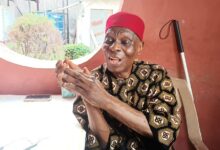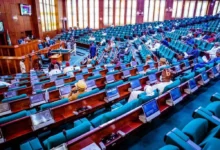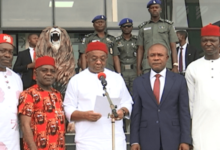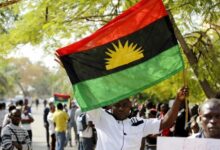
The dispute over Otti’s mayoralty in Aba Written by Nnanna Ochereome
I recently listened to an interview that Lanre Issa-Onilu, the DG of the National Orientation Agency, or NOA, granted to a Lagos radio station. When questioned, he stated which national goals the NOA led by him will refocus Nigerians toward. Issa-Onilu spoke candidly. He openly acknowledged that after 63 years of freedom, Nigerians had no shared goals.

The dispute over Otti’s mayoralty in Aba Written by Nnanna Ochereome
“Nigerians” are not the same as “Americans” in our context. Nigerian languages like Hausa, Igbo, and Yoruba are what we have. The same issue persists while traveling to the states. We have “indigenes” from many dialectal and tribal groupings.
Due to the oil issue, the indigenous people of Rivers State assert that they belong to a tribe; yet, the conflict between Nyesom Wike and Siminalayi Fubara has revealed the existence of apparent ethnic undercurrents between Igbo and Ijaw speaking communities.
Dr. Alex Otti made it plain shortly after taking office as the Labour Party’s governor of Abia State that non-indigenes will be welcomed into his development plan for the state, emphasizing that Aba is a place where everyone is welcome.
He then appointed “Mayors”—that is, Transition Committee Chairmen—in each of the 17 local government districts. With the exception of Aba, where Otti appointed Anambra natives Ide John Udeagbala as mayor and Nnaemeka Ogbonna as deputy mayor, all of them were natives of those LGAs. These fellas are native to Ababa. They are recognized as the “city fathers” and cornerstones of Aba business and industry. They are “Otti’s men” in politics and society; he knows he can rely on them to carry out his plans.
Otti’s personal history had a big influence on his choice. Otti was raised in a multicultural environment, which has influenced his political development over the last ten years. Lazarus Otti, an Adventist preacher and teacher, was born in Isiala Ngwa, where Otti’s grandpa moved after leaving Arochukwu.
The townspeople treated the Ottis unfairly because they never forgot that they were “migrants.” His attempt at politics was dogged by the same issue. Given that Abia South, which is made up of the Ngwa and Ukwa groups, was the region that produced the governor, a faction within the Ngwa political class inside the Peoples Democratic Party, or PDP, plotted to remove him from their group. In order to deprive him Ngwa votes, they flaunted his Aro ancestry. Second, Otti was raised and reached the pinnacle of his professional career as a banker in a Lagos influenced by Bola Ahmed Tinubu.
Lagos was regarded as a “home for all” prior to Tinubu. Some Igbo elements even ran for governor of that place in 1999. Today, the political paradigm of Tinubu Bu makes such an aspiration all but unthinkable. Since Tinubu is originally from Osun State, all Yoruba-speaking people now consider themselves to be Lagos “indigenes,” with the freedom to pursue any position. Governor Babajide Sanwo-Olu is, in fact, a native of Ogun State. This Yoruba “unity” effectively counteracts the non-Yoruba population of Lagos’s expanding political dominance.
However, the original indigenous people are greatly assimilated and marginalized during this process.
Lagos is the only state in the nation where the so-called ara oke (interior Yoruba elements) have such a strong hold over political and economic matters that the original indigenes are unable to establish full control over their state. Otti is a member of the elite Igbo groupings that have long advocated for Igbo unification as a potent means of resolving some of their issues inside the unfriendly Nigerian system. Of the three major ethnic groups in Nigeria, Igbo people are the most independent because of their historical and cultural contexts. All Muslims, regardless of ethnic background, are welcome in the Muslim North.
Northerners are at home anywhere in the North, especially Muslims. Politically speaking, the Yoruba band together due to their shared ethnic identity. This has been Tinubu’s method of responding to alleged political threats in Lagos from non-Yoruba parties. The Igbo strive to bring their diverse aspects together in an attempt to rival their partners. Only the Igbo exhibit the most significant intragroup division among the three major ethnic groups. Governor Chukwuma Soludo, for example, openly attributes the crime and instability in his state to non-Anambra Igbo citizens; this is the exact opposite of what Otti is doing in Abia.
Other Igbo non-indigenous civil servants were sent back to home states by all but Abia when the East Central State was divided into five states. They declined to provide the retirees with their benefits. Everything went up in smoke when former Governor T. A. Orji chose to implement the same policy after observing the high number of Abians from neighboring states who were turned away. Nigerians are entangled in a complex web of how to settle the indigenous/settler dispute in relation to the constitutional guarantee that every Nigerian has the freedom to migrate, settle, work, live in safety, practice any religion they choose, vote, and be eligible to vote anywhere in the country.
Nigerians enjoyed constitutional guarantees of freedom of speech and even won elections in other regions prior to the establishment of states in 1967. However, Nigerians no longer have any constitutional rights because of the state system. Otti ought to exercise Solomonic caution when it comes to the Aba Mayoral affair. A legal requirement exists for the appointment of native people to specific positions.
It needs to be honored. However, especially in Aba, any qualified person ought to be able to cast a ballot and be elected. Residents of Aba, both native and non-native, must be properly included in its governance and development. Ethnicization is not something that cities like Abuja, Lagos, Aba, Kaduna, Enugu, and others can afford. For everyone, they serve as homes.











